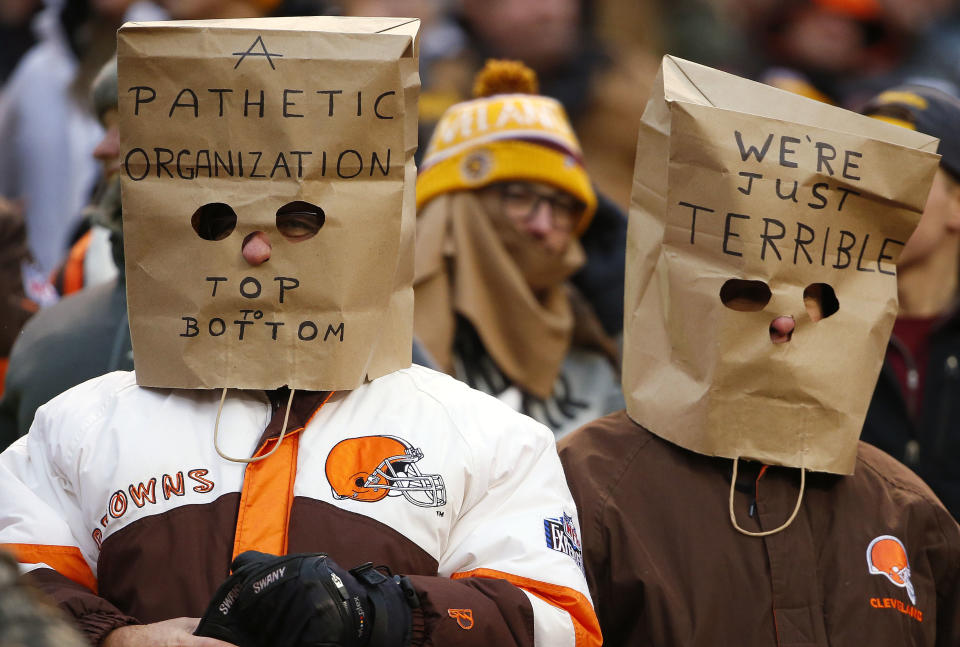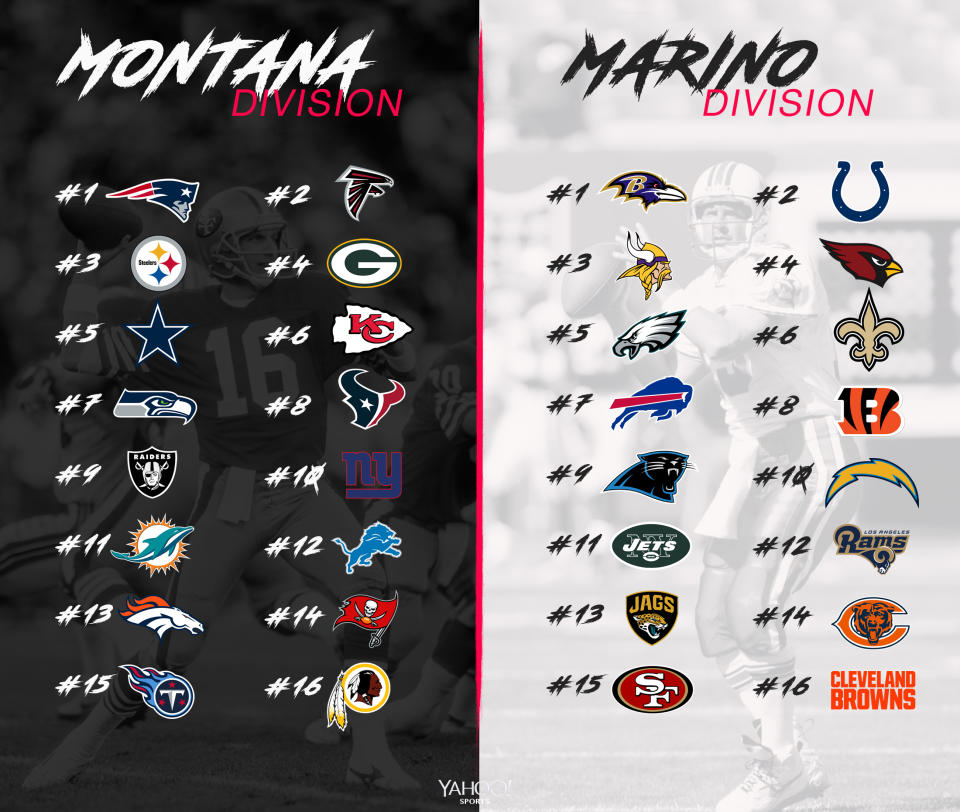Imagine an NFL with soccer-style relegation
There is no more entertaining nor more lucrative professional sports league in the world than the NFL. It monopolizes fall Sundays in the United States with unrelenting drama. It will take in around $14 billion in revenue in 2017. Its popularity is almost unfathomable.
Its games, though, can sometimes be insufferably boring.
Think about Thursday’s matchup between the Los Angeles Rams and the San Francisco 49ers. Or every Cleveland Browns game this decade. When was the last time a Browns game had meaningful implications?
Ah, but see, the problem isn’t the Browns. All pro sports leagues have pathetic franchises. The problem, rather, is the structure of the league itself. And there’s a simple solution to the problem: NFL relegation.
[Watch on Yahoo: Ravens vs. Jaguars live from London Sept. 24]
For the uninitiated, relegation is the meritocratic system that governs almost all of European soccer. The principle is simple: Each season, the worst teams in the first division get relegated to the second division. The best teams in the second division get promoted to the first. The same relationship exists between the second and third divisions, and the third and fourth, and so on. No club is ever safe in the top flight; no club is ever confined to lower tiers.

In anecdotal terms: Every miserable Browns season is currently rewarded with a high draft pick. What if, instead, each one could be penalized with demotion out of the NFL?
Sure, we’d have to find a new social media punching bag. But the league would probably be better off. And those games the Browns played to try to salvage their place in the NFL? They’d be wonderful entertainment.
But simply booting the Browns out of the NFL isn’t plausible. A complex promotion-relegation system is necessary. Fortunately, that’s exactly what we’ve concocted.
How would relegation in the NFL work?
The best way to institute a promotion-relegation system in the NFL would be to divide the league into two 16-team divisions: a top tier – we’ll call it the Joe Montana Division – and a bottom tier – the Dan Marino Division. For practicality’s sake, we’ll split the NFL into those two divisions based on 2016 record:

The two divisions would still comprise a single entity, the NFL, and all 32 teams would abide by the same roster and salary-cap rules. They’d participate in the same NFL draft. They’d receive equal revenue shares. But only teams in the Montana Division could compete for Vince Lombardi trophies. In the regular season, games would be exclusively intradivision.
That regular season would consist of 15 games per team – one against each divisional opponent. Each team would play seven home games, seven away games and one at a neutral site. In the Montana Division, those neutral site games would travel to foreign countries – England, Mexico, Germany, Brazil, China … wherever the NFL saw opportunity to expand its reach. The Marino Division neutral-site games would be played in non-NFL cities around the United States.
The perfectly balanced schedule would yield a 16-team end-of-season table in each division. Those tables would determine playoff seeding. The traditional NFL playoffs would be reduced to four teams, with the top-seeded team in the Montana Division hosting the fourth-place team in the Montana Division, second hosting third, and the winners meeting in the Super Bowl at a predetermined neutral location.
But that would be just one of four playoff brackets. And it’d be the most boring of the four. Let’s get to the fun part…
The Promotion and Relegation Playoffs

The bottom four in the Montana Division would enter the Relegation Playoffs. The 13th-placed team would host 16th place. The 14 seed would host No. 15. Losers of the two semifinals would be relegated to the Marino Division.
The winners would move on to a second round at a neutral location, with the winner of that game staving off relegation and retaining its place in the Montana Division. But the loser – the team that won its first Relegation Playoff game but lost its second – wouldn’t be doomed just yet. More on that team in a bit.
Over at the top of the Marino Division, the four best teams would enter the Promotion Playoffs, which mirror the Relegation Playoffs. No. 1 would host No. 4. No. 2 would host No. 3. The winners would earn promotion to the Montana Division for the following season.
The losers would go to a second round, again played at a neutral site. The loser of that second-round matchup would remain in the Marino Division for another season. But the winner – the team that lost its first Promotion Playoff game but won its second – would go into the Promotion-Relegation Playoff. And it would meet the loser of the Montana Division’s second-round Relegation Playoff game.
So, we have at least two teams relegated and two teams promoted every season. And we could get a third. The teams that come out of the Relegation and Promotion Playoffs with one win and one loss would clash in a third game at a neutral location. Winner goes to the Montana Division. Loser goes to the Marino Division. And the two 16-team divisions for the following season are set – well, almost.
Wait, but none of this explains how we can kick the Browns out of the NFL …
Now on to the really fun part. The bottom four finishers in the Marino Division – the four worst teams in the NFL – would also go into a four-team playoff bracket, with No. 13 hosting No. 16 and 14 hosting 15. Winners would live to see another year in the NFL. Losers would “advance” to a Toilet Bowl of sorts. The winner of that Toilet Bowl would also be safe. But the loser?
They’d give us an answer to the age-old question of whether the most pathetic NFL team would beat the most dominant college team head-to-head.
Actually, why confine this to college football? The loser of the NFL’s Toilet Bowl would be sent to a four-team Interleague Playoff. The other three participants: College football’s national champion, the winner of the Grey Cup (Canadian Football League) and the winner of the ArenaBowl (Arena Football League).

The four would participate in a random drawing. The draw would not only determine semifinal matchups, but also home-field advantage and rulebooks. The AFL and CFL games fundamentally differ from the NFL and college games, which is problematic. But it also adds extra intrigue. Any NFL team would trounce any AFL or CFL team (and any college team) if the game were played by NFL rules. But if the game were played eight-on-eight on a 50-yard field? Or 12-on-12 with the goalposts at the front of the end zones rather than the back?
The NFL team might still romp. But there’s only one way to find out. Imagine the Kevin Hogan-led Cleveland Browns being given two weeks to learn CFL rules, with no practices in pads, then traveling to Calgary or Winnipeg with their NFL status on the line. And if they won, how would they fare in the Interleague Playoff final in Tuscaloosa against Nick Saban’s Crimson Tide?
So what happens if an NFL team gets relegated out of the league?
If an NFL team somehow lost to an AFL, CFL or college team, its players would have a choice: Stay under contract and get paid but don’t play any football for a year, or void the contract and become an NFL free agent. The franchise would not play competitive games until the following winter, when it would fill out its roster with NFL free agents and prepare to re-enter the Interleague Playoff.
The AFL, CFL or college team would continue to operate under its own league’s or association’s rules. So Alabama’s 10 future first-round draft picks would have to wait a year or two to get paid. But rather than play 12-plus games against the SEC and other colleges, ‘Bama would play a legitimate NFL schedule. Same goes for any AFL or CFL Interleague Playoff winner.
The demoted NFL team would then enter the following year’s playoff as the representative from the league that stole its NFL spot. So let’s say the Browns lost to the Calgary Stampeders in the 2017 Interleague Playoff final. Calgary would play 2018 in the NFL’s Marino Division. It would almost certainly lose the Toilet Bowl. It would enter the Interleague Playoff against the 2018 (technically 2019?) college national champ, the 2018 ArenaBowl champ and, rather than the 2018 Grey Cup champ, the Browns.
An alternative plan to get rid of the Browns
There are several obvious logistical flaws in the Interleague Playoff scheme. How about this more realistic one: The NFL’s Toilet Bowl Playoffs still run under the same format, but with no immediate penalty to the loser. Instead, the threat of relegation would arise over multiple years of futility.
If a franchise lost the Toilet Bowl twice in three seasons, it would be disbanded, and replaced by an expansion franchise chosen by the league from a list of bidders. The disbanded team could later bid to re-enter the NFL, but it would have to wait for another NFL team to lose the Toilet Bowl twice in a three-year span.
How would this system improve the NFL?
The benefits would be plentiful. First of all, it would ramp up the importance of almost every single regular-season game. The only lame-duck games would be the ones between two teams eliminated from playoff contention but assured of a finish above the bottom four.
And although the NFL playoffs would be shorter, the Relegation and Promotion Playoffs would be massive occasions. Think about the Redskins and Giants playing at the Meadowlands with relegation to the Marino Division on the line. Or the Ravens and Bengals, after strong seasons in the Marino Division, squaring off for the right to play next season in the Montana Division. Or the Bills and Jets battling to stay in the NFL altogether.
One drawback of the split-league structure would be the occasional absence of traditional rivalries. For example, the Packers and Bears wouldn’t play each other until one was relegated or promoted. But on the plus side, new rivalries would be born. The Seahawks and Patriots currently see each other once every four years. With our system in place, the NFL’s best teams would meet every season.
To be clear, there is no chance Roger Goodell or a future commissioner would ever make such a drastic and foundational change to a league that is already so prosperous. Owners would never agree to it.
But if they did? Our system, aside from the Interleague Playoff, actually seems plausible. And it would make the NFL even more compelling than it already is.
– – – – – – –
Henry Bushnell covers soccer – the U.S. national teams, the Premier League, and much, much more – for FC Yahoo and Yahoo Sports. Have a tip? Question? Comment? Email him at henrydbushnell@gmail.com or follow him on Twitter @HenryBushnell.
More NFL on Yahoo Sports


